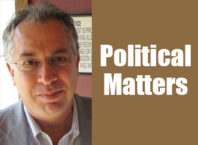By Mordecai Specktor
A Pretendian comes clean
As a non-Native covering issues in Indian Country over more than four decades, I’ve seen a number of odd things. While I’m not putting myself forward as an arbiter of Indian identity, I’ve witnessed some contentious back and forth about Wannabes and Plastic Medicine People, non-Indians asserting some kind of Native identity (or just making nuisances of themselves) and self-appointed ceremonial leaders.
Non-Natives dabbling in Native religion can do some real harm to people. The case that comes to mind was a sweat lodge ceremony led by self-help guru James Arthur Ray, near Sedona, Arizona, in October 2009. During the course of Ray’s five-day “Spiritual Warrior” seminar, some 50 people crowded into a huge sweat lodge. As dozens of hot rocks piled up, many participants began to feel ill. Three people died and 18 others were hospitalized from the “purification” ceremony. Ray was charged with three counts of manslaughter; and at trial, prosecutors and defense attorneys argued over whether the deaths and illnesses were caused by extreme heat or toxins, according to an NBC News report. Ray, who appeared on TV shows hosted by Oprah Winfrey and Larry King, was convicted and served a prison sentence.
In the Pretendian department, a remarkable story broke in early May about Elizabeth Hoover, an associate professor of anthropology at the University of California-Berkeley, who admitted that she’s “a White Person” who “incorrectly” claimed Native identity for her “whole life.”
The story by Martha Ross in The Mercury News (San Jose, Calif.) noted that Hoover issued an apology “that confirmed what other Native American scholars and activists had been saying about her for more than a year – that the Ivy League-educated expert on environmental health and food justice in Native American communities is a White person who long presented herself as a Native American academic, as she built a high-flying academic career and gained a position at one of America’s top public universities.”
As was the case with Massachusetts Sen. Elizabeth Warren, who claimed Cherokee ancestry, Hoover said “she always assumed she was Native American because that’s what she was told while growing up in upstate New York. She said she never knowingly falsified her identity or tried to deceive anyone,” according to the article. “I’m a human,” Hoover said. “I didn’t set out to hurt or exploit anyone.” The Mercury News story mentioned that Hoover’s “case comes amid heightened attention and intense discussions in Native American circles about the complicated nature of Native identity and follows allegations that another well-known Bay Area resident, the late activist Sacheen Littlefeather, spent the past half-century falsely claiming to be White Mountain Apache and Yaqui.”
In 1973, Littlefeather appeared at the Academy Awards ceremony on behalf of Marlon Brando to decline his best actor award for “The Godfather,” citing Hollywood’s sorry history of stereotypical portrayals of Native Americans and using non-Native actors to portray prominent Native people in films over many decades.
In Hoover’s case, Martha Ross wrote: “For much of Hoover’s career, going back to the 2000s, she told people she descended from the Mohawk and Mi’kmaq peoples of eastern Canada and the United States. She referenced this ancestry in news accounts and while researching her doctoral dissertation for Brown University.
“Meanwhile, she won prestigious jobs, grants and fellowships, published books and papers and became a mover and shaker in the ‘food sovereignty’ movement, according to the news site, Indianz.com. But in recent months, she’s been labeled a ‘Pretendian,’ a high-profile figure in academia, publishing or entertainment who is accused of using a false Native American identity for money, fame or professional opportunities.”
The controversy over Hoover’s ersatz Indian identity began last year, when some 360 people, including many Native scholars and activists, along with students from UC-Berkeley and Brown, signed on to a petition calling on her to resign.
“Scholars at Columbia and UCLA echoed the views of those who say the university is justified in firing her, with Mohawk scholar Audra Simpson, an anthropology professor at Columbia, arguing that Hoover’s professional history shows she ‘lacks the requisite ethical and academic integrity to be a professor or a social scientist,’” according to The Mercury News.
Last December, UC-Berkeley announced that Hoover would not be removed. The Hoover case also brings to mind the controversy over Ward Churchill, who was fired from his professor post at the University of Colorado-Boulder, in 2007, for misrepresenting his ethnicity, plagiarism, fabrication and falsification. Churchill who said that he had Muscogee and Cherokee ancestry was active in the Denver chapter of the American Indian Movement and wrote numerous books on Native issues. An Indian acquaintance from Denver told me that he always thought Churchill was a “white man.”





